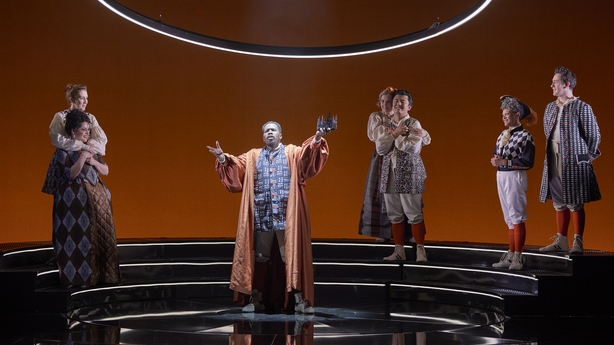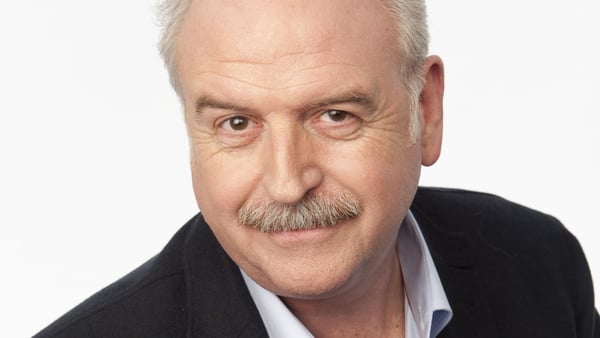Director Daisy Evans talks about the creative process behind Irish National Opera's new production of Vivaldi's masterwork L'Olimpiade, currently touring Ireland from 20th April to 9th May before travelling to London for a sold-out run at the Royal Opera House.
Vivaldi's L’Olimpiade is an exciting mix of emotions, narrative, energy and ambition. It has the kind of pace that makes the entire thing feel like a race to the end. It is generous in its spread of narrative space and time between its diverse cast of characters: princes, shepherds, kings and servants. We are drawn to really care who might win the great game that forms an arch over the whole opera. I present to you a piece of ensemble theatre, inspired by ancient Greece, but interpreted with the joyful gameplay of theatre.
We need your consent to load this rte-player contentWe use rte-player to manage extra content that can set cookies on your device and collect data about your activity. Please review their details and accept them to load the content.Manage Preferences
Listen: RTÉ Arena talks to the makers of L'Olimpiade
Our cast arrive on stage as a team of athletes, headed by their coach Aminta, to bring you the story of L'Olimpiade. While its title suggests it’s all about the Olympics, we’re over and done with the games by the time we reach the beginning of Act II, and we never get to see any of the action. Another possible interpretation of the title would be Olympiad, a classical Greek term used to denote a period of four years, marked by an opening festival of the Olympic Games. This makes more dramaturgical sense. The opera’s themes of rebirth, reconnection, and re-establishment of relationships can all be understood as the dawning of a new era, or the opening of a new Olympiad.
Ultimately, this piece is a journey from loneliness to joy: almost Shakespearean with its lost lovers, its complicated love triangles, and its family cast adrift through time.
The opera is set in ancient Greece, and the opportunity to use the practice of Greek theatre was too strong to ignore. My own directorial practice was originally inspired by these Aristotelian techniques. For me, the presence of the ensemble, the unities of place, action and time, and the pressing urgency of fate, all drive intense and engaging theatre. Certainly, in L’Olimpiade, we open with a great prophecy: King Clistene (in a very King Priam move) receives a prophecy that his son will grow up to kill him. Like Priam, he instructs a servant, Alcandro, to do away with the child, but Alcandro can’t bring himself to do the dreadful deed. Instead, he abandons him on a hillside, where the baby is rescued and reared in the house of the King of Crete as Prince Licida. Unlike the accursed Priam, King Clistene dodges the fateful assassination attempt and father and son are joyfully reunited.
We need your consent to load this YouTube contentWe use YouTube to manage extra content that can set cookies on your device and collect data about your activity. Please review their details and accept them to load the content.Manage Preferences
Watch: L'Olimpiade in rehearsals
Another intriguing Greek character is Licida’s tutor, Aminta, a presence in the drama that seemed to me far more technical. Aminta is the one who tells us what happens off stage, who is thrice left to soliloquise on the state of humanity, and who is the voice of reason to all. This is a Greek chorus leader, someone who drives the action and helps us understand the drama. She is the one who delivers important news, and who the ensemble look to for their next move.
In creating the visual world of the piece, designer Molly O’Cathain and I looked to antiquity for our amphitheatre-inspired set, and to Greek pottery for our colour palette of clay, high-shine black, and ash. You’ll also see Greek-inspired friezes throughout the show. Original Olympic pottery friezes inspired our own depiction of the games as well as Molly’s pattern designs. However, we didn’t want to take the piece down the Greek route entirely. As classicists might point out, while this libretto has many similarities with Greek drama, it is also a Baroque interpretation of events. And, of course, you’re hearing it all through its wonderful Baroque score. That’s why we decided to visually interpret ancient Greece through a Baroque lens, our characters clothed in fashion from the 1730s.

Meili Li, Rachel Redmond (Aminta) and Seán Boylan (Alcandro) in L'Olimpiade
The final layer is our own 21st-century view of all of this. The super-arch over it all is you, sitting in the audience watching it, and us, the players. It would be a shame to deny us any sporting visuals because of the absence of gameplay in the libretto. So my final layer of interpretation comes back to the Olympic Games, as the ensemble arrives in their base costume: a modern-day sports uniform. They put on their characters like you might don a team sweater to enter the fray of the match. And in so doing they change and alter the course of the piece, progressing and adding pace to the narrative as it unfolds before us, just as a sports player might. It helps us accept and understand the twisting, turning narrative of L’Olimpiade, while helping us care and build a connection with each of the characters.
Ultimately, this piece is a journey from loneliness to joy: almost Shakespearean with its lost lovers, its complicated love triangles, and its family cast adrift through time. We begin in a dark place. The young ones are emotionally damaged from living under the strictures of their elders, in a world where daughters are prizes to be won, and sons must do what their fathers say on pain of exile. But all is overcome in the turning of this Olympiad. Perhaps it will be the King who changes his ways, and opens his eyes. In this sense, the piece holds a poignant and contemporary message for us all. Perhaps we should consider new modes of governance and judgement. We might be happier.
L'Olimpiade is currently touring Ireland until 9th May - find a venue near you here.

